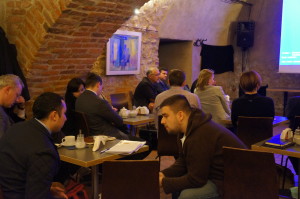SPCleantech and Life Science Cluster organized their first BioCommunity (Biodiversity) Club meeting on January 21, 2016 at NordicHouse, the headquarters of SPCleantech. Bio-economy is one of the specific directions of the Intelligent Specialization of the “Life Science” in Małopolska, which includes technologies, products and processes that use renewable, biological resources to produce food, materials and energy.
Program of the meeting:
- How to use biogas? Reminiscences from the project preparation meeting of the Avant-garde Initiative (Energy Solutions Company)
- Avant-garde Initiative and planned pilot topics
- Bioeconomy Open Space during ECB 2016 – an invitation to present projects
- Exchange
- Networking

The Vanguard Initiative (New Growth through Smart Specialization) is a joint venture of 29 European regions aimed at more effective implementation of smart specialization strategies by:
- linking regional development programs with regional, national and European strategies. Members of the Initiative agree on the need to build joint programs, create critical mass, and combine expertise in new technologies and markets;
- co-ordination of joint investments, resulting from the implementation of joint programs. Members of the Initiative agree on the appropriateness of pooling resources with European funds dedicated to new markets and technologies;
- to develop regional partnerships and clusters that have the potential for smart, specialized, and world-class clustering to give them global competition. Members of the Initiative agree on the need for internationalization of clusters through supra-regional and sectoral partnerships.
Current pilot topics defined within the Avant-garde Initiative:
- Aromatics.
- The aim is to move towards pilot (kg scale) production so that end-users can test novel materials, as well as to expand current activities and outreach towards end-users and other sectors and to diversify potential feedstocks. There is large industrial interest on this topic and key is to accelerate development through the network such that the EU can keep its top position in this area.
- Fine chemicals from lignocellulosic feedstock using fermentation.
- This case relates to the lignocellulose case proposed by Biobased Delta, wherein fermentation of sugars obtained from sugar beet and lignocellulose will be used at large scale to produce cost-effectively a variety of basic and fine chemicals. An important activity is to map the EU value chain and to build up a business case. Things are gaining pace in The Netherlands, but this approach can be expanded to other region to upscale and get access to wider value chains.
- Gas fermentation from gaseous waste streams.
- The idea here is to use gas as input for production of a number of chemicals. One can start from gas waste streams (e.g. Arcelor Mittal is setting up a big project for ethanol production) or using gasified biomass (e.g. from industrial/municipal waste). The idea is to test and optimize the gas fermentation of a number different gas streams.
- Bioplastics for food packaging.
- This case will focus on the food packaging area as several lead users in different regions are heavily interested/active in this. Key drivers for switch to bioplastics include better performance and sustainability (using local, renewable feedstocks), especially in the niche of ‘biofood’ this is relevant. Activities include developing/testing materials for packaging purposes. Strong involvement of lead users (market pull) is considered key in this area, which applies also to many other Vanguard cases!
- Aviation Fuels.
- Aviation is an interesting area for biofuels because biofuels aviation companies anticipate higher taxes on fossil fuels in the near future. In order to be successful in this area however, it is important to connect to existing key players (notably Sky Energy). Värmland will take stock of the current interests and reflect on a potential case.
- Biogas Beyond Energy.
- Key is to move from a single-product process to a multi-products process. Biogas activities can be expanded in many ways, e.g. by using gas as car fuel or valorizing the digestate as lignocellulose source for production of a number of chemicals and materials. As such, the biogas case relates to many other cases. In the meeting in Milano, two outputs will be targeted: common vision, common roadmap with activities linked to the roadmap.
- Food applications from algae feedstocks.
- An inventory will be made of the different interests and whether they fall within the scope of Vanguard (post research phase), then a decision on this case will be made. To this end, a telco will be organized in the coming weeks.
- Food/feed from agrofood waste.
- From agrofood waste a number of useful components can be extracted, e.g. proteins, which are heavily imported to be used as animal feed. Scotland will develop a first note on the extraction of proteins from brewing/distilling waste for fish feed and then the overlap with interests of other regions interested in feed (South Netherlands) or food (Asturias, Navarra) as well as other regions that may want to join (e.g. Flanders) will be explored.


